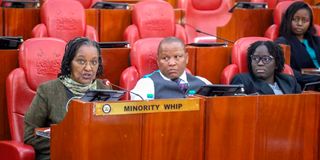Why KNCHR wants law on attempted suicide repealed

From left: KNCHR team, Prof Mariam Mutugi, Kamanda Mucheke and Beryl Orao before the ad hoc House committee investigating the Shakahola deaths on July 5.
The national human rights body has called for amendment of the Penal Code to remove criminal liability on individuals who attempt to die by suicide.
This as the Kenya National Commission on Human Rights (KNCHR) faulted the government over the arrest and arraignment of followers of controversial preacher Paul Mackenzie.
As part of far-reaching proposals on how to handle survivors of religious extremism in the wake of the Shakahola deaths, the commission argues that individuals who attempt to kill themselves suffer from mental illnesses and deserve to be taken for medical care instead of being arrested and charged.
Making their presentation before Tana River Senator Danson Mungatana-led committee investigating Shakahola deaths and religious extremism, KNCHR Commissioner Mariam Mutugi said fundamental human rights and freedoms of survivors of the Shakahola tragedy — which has so far claimed more than 330 lives — have been violated.
Prof Mutugi said science has confirmed that individuals who attempt to end their lives have mental illness.
She said rather than prosecute people with suicidal tendencies, they should instead be taken to mental care facilities as they need help.
To achieve this, Prof Mutugi said, Section 226 of the Penal Code which slaps criminal liability on individuals who attempt to commit suicide should be amended.
“The continued criminalisation of attempted suicide has not and does not deter the practice, but instead exacerbates stigma against persons with mental health conditions, thus preventing them from reaching out and seeking help,” Prof Mutugi said.
While calling for the withdrawal of any charges of attempted suicide against the survivors of the Shakahola tragedy, she argued that charging the survivors only serves to re-traumatise them at a time when they most desperately require empathy, intense psycho-social assistance, rehabilitation and community support.
“Sending them to our already congested prisons shall further aggravate their plight including adverse mental health consequences,” Prof Mutugi said.





